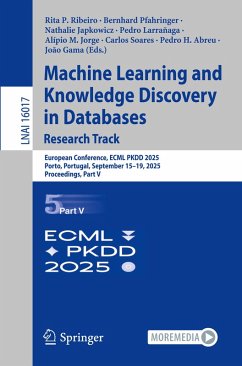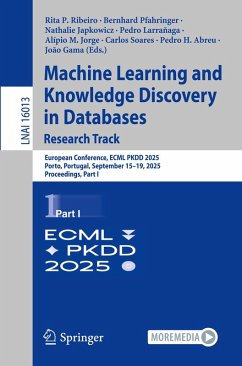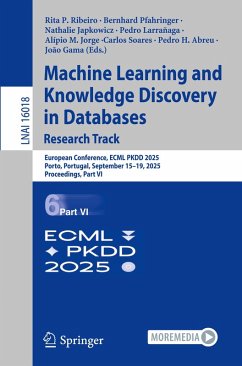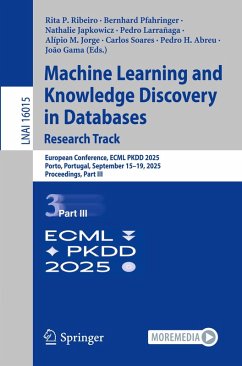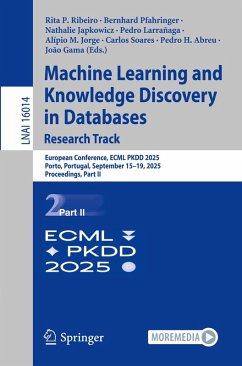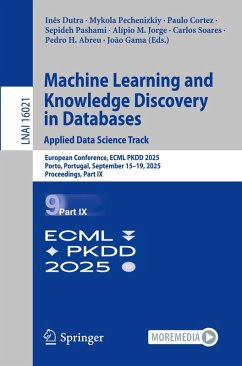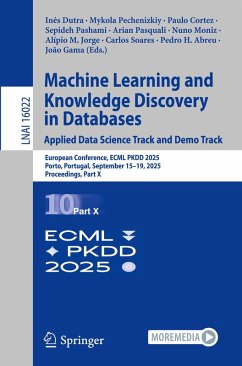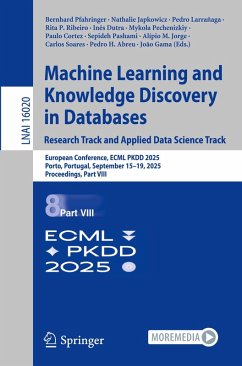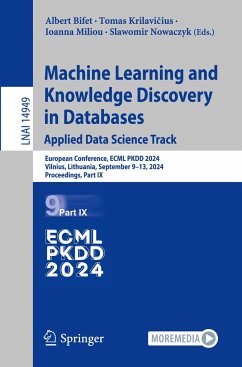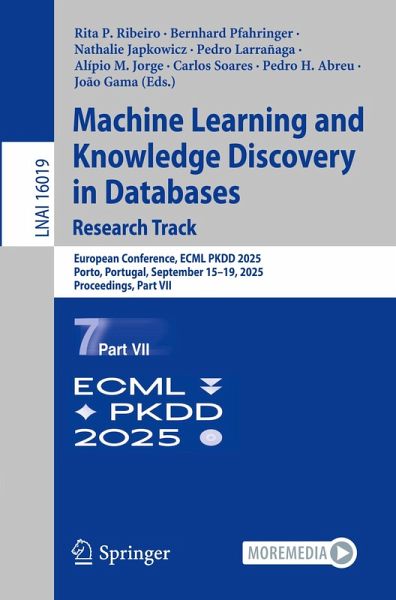
Machine Learning and Knowledge Discovery in Databases. Research Track
European Conference, ECML PKDD 2025, Porto, Portugal, September 15-19, 2025, Proceedings, Part VII
Herausgegeben: Ribeiro, Rita P.; Pfahringer, Bernhard; Japkowicz, Nathalie; Larrañaga, Pedro; Jorge, Alípio M.; Soares, Carlos; Abreu, Pedro H.; Gama, João

PAYBACK Punkte
31 °P sammeln!
This multi-volume set, LNAI 16013 to LNAI 16022, constitutes the refereed proceedings of the European Conference on Machine Learning and Knowledge Discovery in Databases, ECML PKDD 2025, held in Porto, Portugal, September 15 19, 2025.The 300 full papers presented here, together with 15 demo papers, were carefully reviewed and selected from 1253 submissions. The papers presented in these proceedings are from the following three conference tracks:The Research Track in Volume LNAI 16013-16020 refers about Anomaly & Outlier Detection, Bias & Fairness, Causality, Clustering, Data Challenges, Diffus...
This multi-volume set, LNAI 16013 to LNAI 16022, constitutes the refereed proceedings of the European Conference on Machine Learning and Knowledge Discovery in Databases, ECML PKDD 2025, held in Porto, Portugal, September 15 19, 2025.
The 300 full papers presented here, together with 15 demo papers, were carefully reviewed and selected from 1253 submissions. The papers presented in these proceedings are from the following three conference tracks:
The Research Track in Volume LNAI 16013-16020 refers about Anomaly & Outlier Detection, Bias & Fairness, Causality, Clustering, Data Challenges, Diffusion Models, Ensemble Learning, Graph Neural Networks, Graphs & Networks, Healthcare & Bioinformatics, Images & Computer Vision, Interpretability & Explainability, Large Language Models, Learning Theory, Multimodal Data, Neuro Symbolic Approaches, Optimization, Privacy & Security, Recommender Systems, Reinforcement Learning, Representation Learning, Resource Efficiency, Robustness & Uncertainty, Sequence Models, Streaming & Spatiotemporal Data, Text & Natural Language Processing, Time Series, and Transfer & Multitask Learning. The Applied Data Science Track in Volume LNAI 16020-16022 refers about Agriculture, Food and Earth Sciences, Education, Engineering and Technology, Finance, Economy, Management or Marketing, Health, Biology, Bioinformatics or Chemistry, Industry (4.0, 5.0, Manufacturing, ...), Smart Cities, Transportation and Utilities (e.g., Energy), Sports, and Web and Social NetworksThe Demo Track in LNAI 16022 showcased practical applications and prototypes, accepting 15 papers from a total of 30 submissions. These proceedings cover the papers accepted in the research and applied data science tracks.
The 300 full papers presented here, together with 15 demo papers, were carefully reviewed and selected from 1253 submissions. The papers presented in these proceedings are from the following three conference tracks:
The Research Track in Volume LNAI 16013-16020 refers about Anomaly & Outlier Detection, Bias & Fairness, Causality, Clustering, Data Challenges, Diffusion Models, Ensemble Learning, Graph Neural Networks, Graphs & Networks, Healthcare & Bioinformatics, Images & Computer Vision, Interpretability & Explainability, Large Language Models, Learning Theory, Multimodal Data, Neuro Symbolic Approaches, Optimization, Privacy & Security, Recommender Systems, Reinforcement Learning, Representation Learning, Resource Efficiency, Robustness & Uncertainty, Sequence Models, Streaming & Spatiotemporal Data, Text & Natural Language Processing, Time Series, and Transfer & Multitask Learning. The Applied Data Science Track in Volume LNAI 16020-16022 refers about Agriculture, Food and Earth Sciences, Education, Engineering and Technology, Finance, Economy, Management or Marketing, Health, Biology, Bioinformatics or Chemistry, Industry (4.0, 5.0, Manufacturing, ...), Smart Cities, Transportation and Utilities (e.g., Energy), Sports, and Web and Social NetworksThe Demo Track in LNAI 16022 showcased practical applications and prototypes, accepting 15 papers from a total of 30 submissions. These proceedings cover the papers accepted in the research and applied data science tracks.




